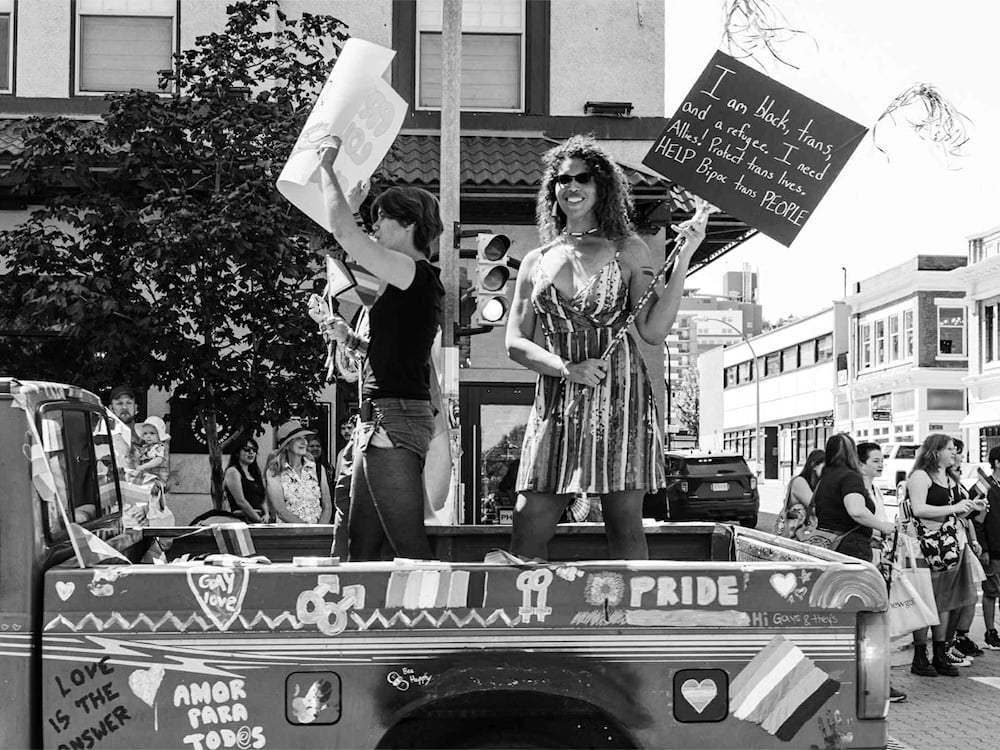Lifestyle
Black and Trans Americans Seek Asylum in Canada Amid Rising Violence

The landscape for Black and transgender individuals in the United States has become increasingly perilous, prompting some to seek asylum in Canada. Following a controversial speech by conservative commentator Michael Knowles at the 2023 Conservative Political Action Conference, which called for the “eradication of transgenderism,” many have expressed concerns for their safety. Among them is Zara Sluys X, a biracial Black woman who has faced violence and discrimination throughout her life in the U.S.
Sluys X, who has already suffered severe trauma—such as being shot in the head with a BB gun by a white babysitter—decided to leave for British Columbia in January 2023. Initially relocating with her husband, who was sponsoring her immigration, her situation took a turn for the worse due to domestic violence. Now residing in transitional housing for victims, Sluys X plans to apply for asylum in Canada, citing the lack of safety for Black and trans people in the U.S.
The urgency of her situation is underscored by alarming statistics. Last year, 32 trans and gender non-conforming individuals were murdered in the U.S., with over half of these victims being Black trans women. According to a 2021 study from the University of California, Los Angeles, trans individuals are four times more likely than their cisgender counterparts to experience violent victimization.
Calls for Change in Canadian Asylum Policies
In light of these issues, Cait Glasson, an Ontario-based LGBTQ2S+ advocate, initiated an online parliamentary petition in 2023. This petition calls on the Canadian government to extend the right to claim asylum to trans and non-binary individuals facing exclusionary legislation in their home countries, particularly highlighting the U.S. and the U.K. By mid-2023, the petition garnered over 160,400 signatures, marking it as the third most-signed petition at that time.
Glasson, who is assisting Sluys X in her asylum application, expressed concern that Canada might deny asylum to trans refugees, reminiscent of the treatment of Jewish refugees in 1939. “They went back to Europe, where a third of them were killed in the Holocaust,” she stated.
Despite these alarming trends, the Canadian government has been reticent to comment on the asylum process for LGBTQ2S+ individuals. A spokesperson for Lena Metlege Diab, Minister of Immigration, Refugees and Citizenship Canada, stated that the ministry does not collect statistics on asylum seekers based on gender or sexual orientation, and emphasized that they cannot speculate on future policy decisions.
While Sluys X hopes to be a pioneer in this realm, she is not the first trans American to apply for asylum in Canada. A report from Reuters highlighted that out of 55,000 asylum claims filed in the first half of 2023, 245 originated from Americans, including at least two trans individuals.
Systemic Violence and Legislative Challenges
The systemic violence faced by trans individuals in the U.S. is exacerbated by recent legislative actions. In 2023 alone, 987 anti-trans bills were introduced across 49 states, with 122 of them passing. These laws often target access to healthcare, participation in sports, and education about gender identity. Moreover, former President Donald Trump has publicly endorsed the idea of banning Pride flags, further contributing to a climate of hostility.
Legal experts like A. Connie Campbell, a Vancouver-based lawyer specializing in LGBTQ2S+ immigration, note that asylum seekers must demonstrate they face significant persecution in their home country. This includes evidence of physical harm, denial of public services, or politically motivated legal prosecution due to their identity.
Despite the challenges, Sluys X holds out hope for the future of Black asylum seekers in Canada. “The last time my people were brought here, it had to be clandestine with the Underground Railroad,” she said. She advocates for recognition of the need for refuge among Black and trans individuals, questioning whether asylum can be granted openly rather than through back channels.
The Canadian government has historically welcomed Black asylum seekers, and the current climate in the U.S. underscores the need for such support now more than ever. With ongoing violence and discrimination, the urgency for Canada to reevaluate its asylum policies could not be clearer.
-

 Lifestyle3 weeks ago
Lifestyle3 weeks agoWinnipeg Celebrates Culinary Creativity During Le Burger Week 2025
-

 Science1 month ago
Science1 month agoMicrosoft Confirms U.S. Law Overrules Canadian Data Sovereignty
-

 Education4 weeks ago
Education4 weeks agoRed River College Launches New Programs to Address Industry Needs
-

 Technology4 weeks ago
Technology4 weeks agoDragon Ball: Sparking! Zero Launching on Switch and Switch 2 This November
-

 Science1 month ago
Science1 month agoTech Innovator Amandipp Singh Transforms Hiring for Disabled
-

 Health1 month ago
Health1 month agoMontreal’s Groupe Marcelle Leads Canadian Cosmetic Industry Growth
-

 Technology1 month ago
Technology1 month agoGoogle Pixel 10 Pro Fold Specs Unveiled Ahead of Launch
-

 Science4 weeks ago
Science4 weeks agoChina’s Wukong Spacesuit Sets New Standard for AI in Space
-

 Technology1 month ago
Technology1 month agoWorld of Warcraft Players Buzz Over 19-Quest Bee Challenge
-

 Science1 month ago
Science1 month agoXi Labs Innovates with New AI Operating System Set for 2025 Launch
-

 Business4 weeks ago
Business4 weeks agoDawson City Residents Rally Around Buy Canadian Movement
-

 Business1 month ago
Business1 month agoNew Estimates Reveal ChatGPT-5 Energy Use Could Soar
-

 Technology1 month ago
Technology1 month agoFuture Entertainment Launches DDoD with Gameplay Trailer Showcase
-

 Technology1 month ago
Technology1 month agoGlobal Launch of Ragnarok M: Classic Set for September 3, 2025
-

 Technology1 month ago
Technology1 month agoNew IDR01 Smart Ring Offers Advanced Sports Tracking for $169
-

 Technology1 month ago
Technology1 month agoInnovative 140W GaN Travel Adapter Combines Power and Convenience
-

 Technology1 month ago
Technology1 month agoHumanoid Robots Compete in Hilarious Debut Games in Beijing
-

 Science1 month ago
Science1 month agoNew Precision Approach to Treating Depression Tailors Care to Patients
-

 Health1 month ago
Health1 month agoGiant Boba and Unique Treats Take Center Stage at Ottawa’s Newest Bubble Tea Shop
-

 Technology1 month ago
Technology1 month agoQuoted Tech Launches Back-to-School Discounts on PCs
-

 Technology1 month ago
Technology1 month agoDiscover the Relaxing Charm of Tiny Bookshop: A Cozy Gaming Escape
-

 Education4 weeks ago
Education4 weeks agoAlberta Teachers’ Strike: Potential Impacts on Students and Families
-

 Technology4 weeks ago
Technology4 weeks agoArsanesia Unveils Smith’s Chronicles with Steam Page and Trailer
-

 Technology4 weeks ago
Technology4 weeks agoRaspberry Pi Unveils $40 Touchscreen for Innovative Projects










